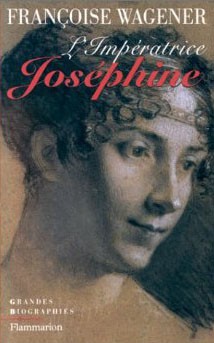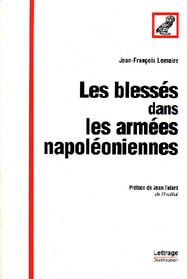History Prizes 1999
 FIRST EMPIRE PRIZES
FIRST EMPIRE PRIZES
François WAGENER, L’Impératrice Joséphine, Paris, Flammarion
When Napoleon placed on Josphine’s finger a gold ring engraved with the legend ‘Au destin’ (To destiny), he meant hers to be linked to his extraordinary career. Indeed, her destiny was to see its zenith in Notre-Dame during the double coronation. In the tumult of the Empire, at the focal point of a monarchy/spectacle such as France had never seen before, Napoleon and Josephine never stopped loving, understanding and supporting each other. Their divorce, undertaken for state reasons in December 1809, pained them both but never really separated them. And Napoleon regretted it to the end. “She was the woman I loved the most. […] She was art and the graces…” were his often repeated words on St Helena.
Without Josephine, Napoleon would not really have been Napoleon. She was the one who awakened love in him, who brought back taste at the end of the Revolution. She was sovereign in everything she did, and her elegance, wisdom and urbanity made her loved by the French. She was in the end the best remembered of France’s three empresses.
Who was Josephine? Françoise Wagener has attempted to get beyond the clichés and give Josephine her true face, to get behind the fascination and hate which her high position of course incited. She was a woman of the 18th century whose code of conduct and aristocratic values never failed, and she was a normal woman trying to cope with exceptional circumstances, “a real woman” as Napoleon put it. A real woman who put her mark on the period.
Françoise Wagener has been director of Le Monde’s Lettres Etrangères column for the last twelve years.
She is the author of several biographies, notably: Madame Récamier (Grand Prix de Lectrices de Elle 1987), La Reine Hortense (Grand Prix d’Histoire de la Vallée-aux-Loups, 1992, Prix Napoléon III 1993), and with Flammarion, La Comtesse de Boigne , a work awarded a crown by the Académie française.

Jean-François LEMAIRE, Les blessés dans les armées napoléoniennes, Paris, Lettrage
Were the soldiers of the Empire ‘tough nuts’ or did they exaggerate their sufferings in order to exalt their levels of service? Advancement was often the direct result of a wound and the Légion d’Honneur was a wounded man’s decoration.
Indeed, the horrors of this sort of warfare, the amputations that went wrong, the death rattle of the dying, should not be played down. It is enough to read what Percy wrote about his experience at Eylau. But did not some emphasise the gravity of their case in order to achieve promotion ?
Another powerful passage in this book is the selection of Napoleon’s correspondence and other documents revealing the emperor’s opinion on the army’s wounded. Of more than 22,000 letters, Dr Lemaire selects 500 in which medicine is discussed. Of these only about 100 deal directly with the wounded. Such a small total is remarkable. Up to 1813, the emperor’s priorities were elsewhere. But afterwards, we see Napoleon concede that the role of the surgeons was not simply to operate but also to organise the collection of corpses and evacuations, in other words to act as commander to the medical personnel. Unfortunately, it was all too late. Not so much lack of money, it was lack of time which lead to this project being left at the back of the drawer.
Another theme on which, in my opinion, the author sheds definitive light is the affair of the wounded at Bautzen. Did the 2000 or so men which Radet was preparing to put in front of the firing squad mutilate themselves or were they wounded in the disorder of the battle? All depended on Larrey’s expert opinion. From the starting point of two erasures in the letter which Napoleon dictated to be sent to Larrey, Dr Lemaire deduces that fundamentally Napoleon did not want to go as far as execution. The poor lads were saved.
Lemaire has frequently written on subjects off the beaten track, and this book, the fruit of long research and containing a wealth of information, is no exception. Indeed the rigour of his diagnoses render the conclusions very persuasive and clear. It is clearly not going to be Lemaire’s last book on this period.
This work is the extention of a thesis in modern history written by the author under the same title at the univerity of Paris IV – Sorbonne, defended on 8 July 1998. The jury was presided over by Pierre Messmer of the Académie française, chancellor of the Institut, ex-Prime Minister and Minister for the Army and included notably Prof Jean Tulard of the Académie des sciences morales et politiques, and Prof Alain Larcan, ex-president of the Académie nationale de médicine.
